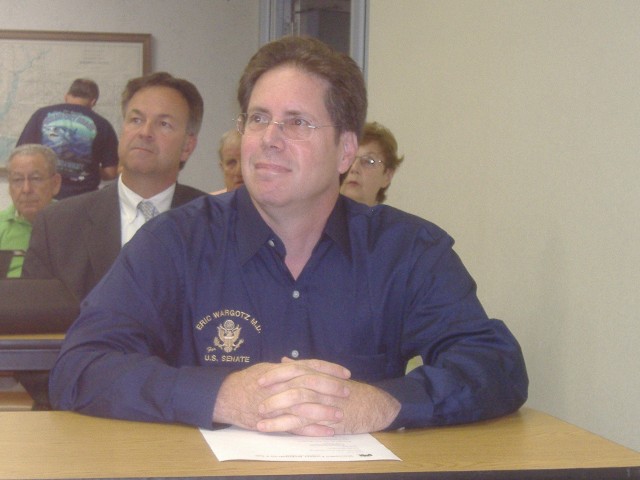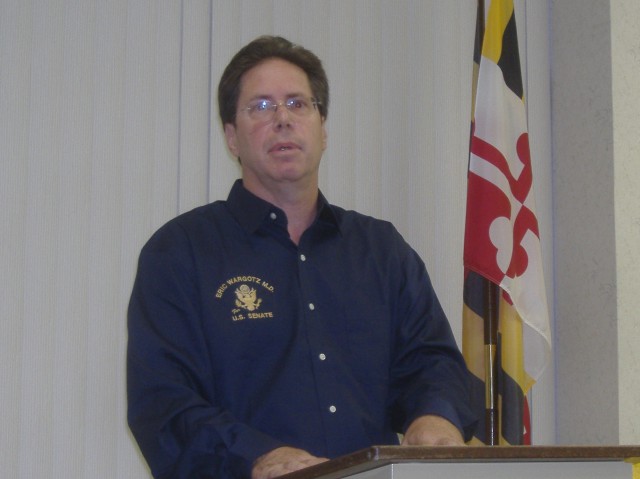Well, that was a fun 40 minutes. Earlier this moring I listened to a conference call with Maryland’s Senator Ben Cardin promoted by the folks at Organizing Against America. It was sort of like sneaking behind enemy lines.
Host Jason Waskey (the State Director) briefly went through the history of OAA, which changed over from an organization to help President Obama get elected to a “special project” of the Democratic National Committee. One of his tasks, Waskey said, was “to make sure plenty of people were at the events” like town hall meetings and such where the subject of health care would come up. But what he was “most proud” about was helping to defeat Michael Steele – isn’t that a touch racist?
Anyway, Waskey concluded his introduction by stating Maryland’s Senators were “very confident” about the bill and “they’ll be great supporters.”
Senator Cardin then jumped on the line and immediately referred to Waskey’s comment on Steele by saying having him as RNC chair was a “plus for Democrats.” (Of course, he can get away with saying such a thing in this crowd.)
But the Democrats in Congress were taking on “the challenges of our time,” which included the “difficult” subject of health care – to the Senator health care was a “moral issue.” Cardin also dismissed the GOP as “they say the status quo is fine.” (And for about 80% of the people the GOP is correct in saying so.)
Then Cardin had some interesting contradictions. In one sentence he said that Majority Leader Senator Reid has “total support to get the bill done,” yet in the next breath he noted “three or four Democrats are uncertain.” And while he considered the Congressional Budget Office “a thorn,” he was all too happy to cite their figures in making some of his claims.
There were several points the Senator claimed would be addressed in the bill:
- The health care bill would provide affordable health care and insurance for “all Americans.” (Even though the CBO numbers say that would be an additional 31 million, bringing it to 98 percent.)
- The bill would bring down costs – Ben claimed that 90% would see a decrease or leveling off of premiums.
- Passing health care would reduce the deficit – we’ve “always exceeded CBO numbers,” said Senator Cardin.
- It “saves Medicare,” and Cardin blasted Republicans for trying to restore the cuts in provider compensation, saying you can’t control costs by cutting Medicare.
On the last point, Senator Cardin questioned the fiscal conservatism of Republicans, daring them to put up an amendment to end Medicare altogether. (Hey, if it were properly written in such a way to wean people off it, I’d vote for that. It’s not like Medicare will be solvent when I reach that age anyway.)
Most of the Medicare savings, though, come from ending the “corporate welfare” of Medicare Advantage (although Cardin didn’t refer to that by name.) Ben predicted in answering a later question that we would save if everyone were on Medicare, as opposed to having some seniors on Medicare Advantage.
One claim made by Senator Cardin that left me scratching my head was that costs would be saved by having fewer people use the emergency room because they were insured. But a key component frustrating many physicans who oppose the health care bill is dealing with both paperwork and the limited compensation insurance companies tend to provide, so if fewer physicans are practicing would that not force people to use the ER for services anyway?
The Senator concluded his monologue by telling the hundreds listening in that this was “not a perfect bill” but “we will build on this in the future.” A slippery slope indeed.
Then some lines were opened up for questions – since I didn’t hear a method of chiming in with my two cents, my suspicion is that the questions were prearranged. While they weren’t softballs, they were akin to sending a high school pitcher out to face the Yankees.
Karen from Bethesda asked when Americans would feel the full effects of the bill.
The immediate effects would come in reforming the insurance industry, said Senator Cardin, with provisions allowing children to stay on parents’ policies through age 26, eliminating the restriction of pre-existing conditions, and coverage caps beginning pretty much upon passage. Setting up insurance exchanges for each state would take more time. (Cardin forgot to mention the taxes would also start immediately, too. I think that answers Karen’s question better than Ben did.)
Delegate Tom Hucker was next, and he queried the Senator about the impact on the state budget and the fairness aspect – states like Maryland with overgenerous Medicaid programs wouldn’t benefit as much as other states which are more prudent. (No, Delegate Hucker didn’t put it in those terms, I did. Of the Delegates I’d love to see voted out – aside from my own – Hucker is number one on the list.)
The federal government would pick up the Medicaid costs, answered Cardin, but the “bottom line is you” at the state level. This bill, though, would “finally get the federal government to acknowledge its responsibility,” said Ben. Returning to his love of the CBO, Cardin confided that they may not be able to score that aspect of the program.
Stephanie, a doctoral student in public health at Johns Hopkins, asked about procedural issues – specifically, is there any merit in working with the GOP on compromise amendments?
It was on this answer that Cardin was his most testy – not at Stephanie, but at Republicans. He asked why, if we’re not getting cooperation, are we allowing the GOP’s “message amendments” to be voted on? “They’re not playing fair,” complained the Senator. But he also admitted that they don’t have the 60 votes quite yet because one member of the caucus seems to want to hear all the amendments before he or she makes the decision. (Obviously it’s an important one.)
Cardin also revealed that a manager’s amendment is in the works, so the bill may get more work done before the final Senate decision.
The discussion then turned to the Stupak Amendment, which, according to the Senator, would “violate the unwritten rule that health care reform is neutral on abortion.” And Senator Cardin was “very, very confident it will be rejected.”
Adam from Potomac asked why no attention to tort reform?
This was another opportunity for Cardin to bash Republicans, saying they wouldn’t vote for the bill even if tort reform was included. (And he’d be right, because there’s too much bad to go along with the good tort reform would provide.) It’s more “rhetoric for Republicans,” noted Cardin, and claimed that “it’s not about tort reform, it’s about killing the bill” for Republicans. Actually, it’s about our freedom and way of life, but I’ll give Cardin a half-point for stating the obvious.
Cardin also said the bill addresses some aspects of defensive medicine by mandating electronic medical records, which would eliminate the need for some testing because various ailments would be ruled out by knowing the patient. Fair enough, so why not that as a stand-alone provision?
The final question went to Nina, in College Park. She asked about the public option.
It was “critically important” that the public option be included, said Cardin. It was being “misrepresented in a terribly irresponsible way” by Republicans, and, as Cardin explained it, the public option would create more choice – as it was, Cardin pointed out in an earlier response that 71% of Maryland residents were enrolled in just two insurance companies. (A beautiful argument for allowing insurance to be sold across state lines rather than creating a government-controlled “exchange.”)
Regarding the public option, Senator Cardin continued that it would also have the effect of nationally regulating the private insurance industry and forcing the insurers to open their books to show how much money was being spent on patient care (as opposed to executive compensation, as Cardin played the class envy card before a receptive audience.) “I’m for the strongest possible public option,” Ben said, even as the Senate version was “already compromised.”
I found it interesting that Senator Cardin compared the public option to how federal employees are served with a number of choices. Yet I don’t see him making a move to eliminate his gold-plated health care.
Worthy of note also is that Cardin praised his Maryland counterpart, Barbara Mikulski, for getting an amendment through that mandates coverage of mammograms and assorted other items. I thought I heard Senator Cardin mention “family planning” among them, which leads me to believe it’s going to cover the a-word.
At that point, Waskey returned to the phone and promised a follow-up e-mail to solicit volunteers to phone bank and call key Senators from a number of states, presumably Democrats who are waffling (although he did mention Maine, so Senators Collins and Snowe are presumed to be soft GOP opposition.) I haven’t received that yet, but it should be as amusing as hearing a partisan Democrat Senator speak before an audience he believes is friendly.




